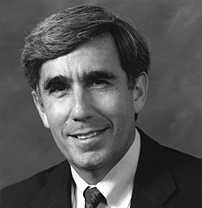|
The
US President's Other
Two
Wars

By
David
Krieger
President, The
Nuclear Age Peace Foundation
TFF associate
January 29, 2002
During his first year in office, George W. Bush has
engaged in three wars. His war against terrorism is
widely known and discussed. His resolve to fight against
evildoers with America's military might is said to have
defined his presidency.
The president's other two wars have received far less
attention, but they may end up defining his presidency
even more than his war against terrorism. These are his
war against international law and his war against the
international control of armaments.
In the war against international law, the president
has shown remarkable boldness in his disdain for the
remainder of the international community. He has pulled
out of the Kyoto Accords on Global Warming, perhaps the
most critical environmental treaty of our time. He has
also demonstrated his contempt for the creation of an
International Criminal Court that would hold individuals
accountable for the types of serious international crimes
that were prosecuted by the United States at Nuremberg
following World War II.
The president's war against the international control
of armaments, however, has been his most successful
undertaking. In one area of arms control after another,
he has demonstrated that he plans to chart the course of
US unilateralism when it comes to decisions on
controlling armaments.
He has made clear that he does not intend to resubmit
the Comprehensive Test Ban Treaty (CTBT) to the Senate
for ratification. When the CTBT came up at the 2001
United Nations General Assembly, the US was the only
country to vote against carrying over an item supporting
the treaty to the next session of the General
Assembly.
The president has also requested studies from the
Pentagon on the possible resumption of nuclear testing.
When the parties to the CTBT met last November to discuss
ways to bring the Treaty into force more rapidly, the US
did not even bother to show up and participate.
Mr. Bush has opposed signing the International Treaty
to Ban Landmines, despite the solid international support
to ban these weapons that go on killing civilians long
after the soldiers have left a war zone. At a UN
conference on small arms, the US blocked key provisions
to stem the illegal traffic in small arms, those most
used in combat. The US also torpedoed a six-year effort
to create a Protocol to the Biological Weapons Convention
that would allow for verification procedures including
on-site inspections.
The president's boldest act, however, in his war
against the international control of armaments was his
announcement that the US is withdrawing from the
Anti-Ballistic Missile (ABM) Treaty. Despite Russian
opposition to taking this step, the president gave his
notice of withdrawal on December 13, 2001, starting the
six months running for withdrawal under the provisions of
the treaty. Withdrawal from the ABM Treaty will give the
US the ability to test weapons for use in outer space,
leading to their deployment in outer space and the
undermining of the Outer Space Treaty as well.
In his November 2001 Crawford Summit with Russian
President Putin, Mr. Bush announced his intention to
lower the size of the US strategic nuclear arsenal to
some 1,700 to 2,200 nuclear weapons over a ten year
period. This unilateral action did not even go as far as
President Putin had been offering for over a year
(reductions to 1,500 strategic weapons or possibly
lower). The president's plan will keep overkill the
principal US nuclear strategy for at least the next
decade. Further, since it has been unilaterally
initiated, it will be subject to unilateral reversal by
Mr. Bush himself or a successor to the presidency.
In taking these steps, Mr. Bush has also demonstrated
his contempt for the nuclear Non-Proliferation Treaty, in
which the US has promised to pursue good faith
negotiations for nuclear disarmament. The International
Court of Justice has interpreted this phrase to mean
complete nuclear disarmament in all its aspects.
As recently as May 2000, the parties to the
Non-Proliferation Treaty promised to preserve and
strengthen the ABM Treaty "as the cornerstone of
strategic stability and as a basis for further reductions
of strategic offensive weapons." At the same time, the US
joined the other parties to the Non-Proliferation Treaty
in promising an "unequivocal undertaking to accomplish
the total elimination of their nuclear arsenals." The
president's actions have helped convince our allies and
treaty partners that US promises are worth very little,
but perhaps this is to be expected when a president is
engaged in war on so many fronts.
©
TFF & the author 2002

Tell a friend about this article
Send to:
From:
Message and your name
|